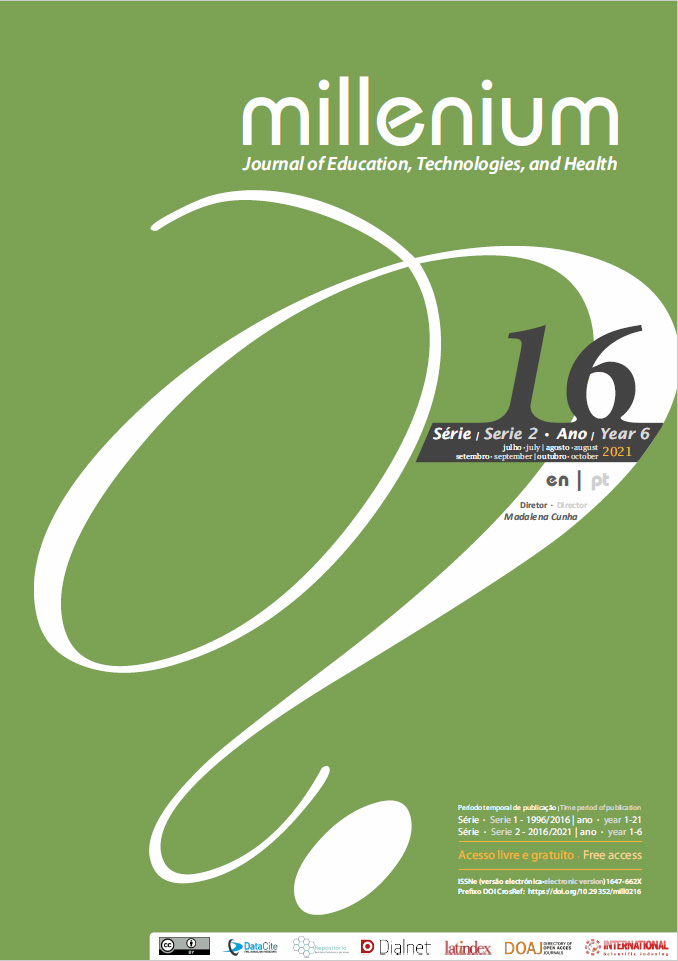Nurses’ perception of simulation-based basic life support training in clinical practice
DOI:
https://doi.org/10.29352/mill0216.24482Keywords:
simulation technique, cardiopulmonary resuscitation, nursesAbstract
Introduction: Simulation-based basic life support training allows nurses to develop their skills to intervene in an emergency context, solidifying procedures and ensuring safety in practice.
Objetive: Understand nurses’ perception of simulation-based basic life support trainings in clinical practice.
Methods: Quantitative, descriptive, and correlational study. Participants were 612 nurses from different health institutions in Portugal. The data was collected through an online questionnaire, and analyzed using the Statistical Package for the Social Sciences (version 21) with descriptive and inferential statistics, according to the nature of the variables.
Results: The study demonstrates that the participants have a positive perception of the developed skills on their clinical practice, with mean values of 4.56±0.71 for understanding the basic life support algorithm, as well as 4.52±0.76 for considering it an excellent contribution to clinical practice and 4.51±0.74 for improved capacity to assess victims.
Conclusion: Simulation-based training is an essential tool in the initial and continuing education of nurses. The promotion of an adequate simulation-based training plan in basic life support for nurses has a positive impact on care provision, meeting the real needs of the patient in cardiorespiratory arrest.
Downloads
References
Armstrong, P., Peckler, B., Pilkinton, C. J., McQuade, D., & Rogan, A. (2021). Effect of simulation training on nurse leadership in a shared leadership model for cardiopulmonary resuscitation in the emergency department. Emergency Medicine Australasia, 33(2), 255–261. doi: 10.1111/1742-6723.13605.
Buléon, C., Delaunay, J., Parienti, J.-J., Halbout, L., Arrot, X., Gérard, J.-L., & Hanouz, J.-L. (2016). Impact of a feedback device on chest compression quality during extended manikin CPR: a randomized crossover study. The American Journal of Emergency Medicine, 34(9), 1754–1760. doi: 10.1016/j.ajem.2016.05.077.
Chu, R., & Robilotto, T. (2018). Mock code training to enhance CPR skills. Nursing Made Incredibly Easy, 16(2), 11–15. doi: 10.1097/01.NME.0000529957.11904.8d.
Colquitt, J. D., Jr, Walker, A. B., & Haney, N. S. (2019). Applying the Pit Crew Resuscitation Model to the Inpatient Care Setting. Journal for Nurses in Professional Development, 35(1), E1–E7. doi: 10.1097/NND.0000000000000495.
European Resuscitation Council. (n.d.). Basic life support. https://www.erc.edu/courses/basic-life-support.
Everett-Thomas, R., Turnbull-Horton, V., Valdes, B., Valdes, G. R., Rosen, L. F., & Birnbach, D. J. (2016). The influence of high fidelity simulation on first responders retention of CPR knowledge. Applied Nursing Research: ANR, 30, 94–97. doi: 10.1016/j.apnr.2015.11.005.
Fraga-Sampedro, M. L. (2018). Simulation as a learning tool for continuing education on cardiorespiratory arrest. Enfermeria Intensiva, 29(2), 72–79. doi: 10.1016/j.enfi.2017.10.003.
Halm, M., & Crespo, C. (2018). Acquisition and Retention of Resuscitation Knowledge and Skills: What’s Practice Have to Do With It? American Journal of Critical Care: An Official Publication, American Association of Critical-Care Nurses, 27(6), 513–517. doi: 10.4037/ajcc2018259.
Herbers, M. D., & Heaser, J. A. (2016). Implementing an in Situ Mock Code Quality Improvement Program. American Journal of Critical Care: An Official Publication, American Association of Critical-Care Nurses, 25(5), 393–399. doi: 10.4037/ajcc2016583.
Kim, S.-O., & Choi, Y.-J. (2019). Nursing competency and educational needs for clinical practice of Korean nurses. Nurse Education in Practice, 34, 43–47. doi: 10.1016/j.nepr.2018.11.002.
Morton, S. B. (2017). Impact of High-Fidelity Simulation Training on Medicalsurgicalnurses’ Self-Confidence & Mock Code Blue Performance: A Pilot Study (Doctoral dissertation). Obtained from https://ninercommons.uncc.edu/islandora/object/etd%3A1022/datastream/PDF/download/citation.pdf.
Portuguese Cardiology Foundation (n.d.). Statistic data. http://www.fpcardiologia.pt/atividades/projeto-salva-vidas/dados-estatisticos/.
Smith, L. R. (2017). Improving Cardiopulmonary Resuscitation Skills Using Unit Based Simulation (Doctoral project). Obtained from https://digitalcommons.gardner-webb.edu/cgi/viewcontent.cgi?article=1296&context=nursing_etd.
Sok, S. R., Kim, J. A., Lee, Y., & Cho, Y. (2020). Effects of a Simulation-Based CPR Training Program on Knowledge, Performance, and Stress in Clinical Nurses. Journal of Continuing Education in Nursing, 51(5), 225–232. doi: 10.3928/00220124-20200415-07.
Vincelette, C., Quiroz-Martinez, H., Fortin, O., & Lavoie, S. (2018). Timely Recognition of Ventricular Fibrillation and Initiation of Cardiopulmonary Resuscitation by Intensive Care Unit Nurses: A High-Fidelity Simulation Observational Study. Clinical Simulation in Nursing, 23, 1–9. doi: 10.1016/j.ecns.2018.07.005.
Whitmore, S. P., Gunnerson, K. J., Haft, J. W., Lynch, W. R., VanDyck, T., Hebert, C., … Neumar, R. W. (2019). Simulation training enables emergency medicine providers to rapidly and safely initiate extracorporeal cardiopulmonary resuscitation (ECPR) in a simulated cardiac arrest scenario. Resuscitation, 138, 68–73. doi: 10.1016/j.resuscitation.2019.03.002.
Więch, P., Sałacińska, I., Muster, M., Bazaliński, D., Kucaba, G., Fąfara, A., … Januszewicz, P. (2019). Use of Selected Telemedicine Tools in Monitoring Quality of In-Hospital Cardiopulmonary Resuscitation: A Prospective Observational Pilot Simulation Study. Medical Science Monitor: International Medical Journal of Experimental and Clinical Research, 25, 2520–2526. doi: 10.12659/MSM.913191.
Downloads
Published
How to Cite
Issue
Section
License

This work is licensed under a Creative Commons Attribution 4.0 International License.
Authors who submit proposals for this journal agree to the following terms:
a) Articles are published under the Licença Creative Commons (CC BY 4.0), in full open-access, without any cost or fees of any kind to the author or the reader;
b) The authors retain copyright and grant the journal right of first publication, allowing the free sharing of work, provided it is correctly attributed the authorship and initial publication in this journal;
c) The authors are permitted to take on additional contracts separately for non-exclusive distribution of the version of the work published in this journal (eg, post it to an institutional repository or as a book), with an acknowledgment of its initial publication in this journal;
d) Authors are permitted and encouraged to publish and distribute their work online (eg, in institutional repositories or on their website) as it can lead to productive exchanges, as well as increase the impact and citation of published work
Documents required for submission
Article template (Editable format)





